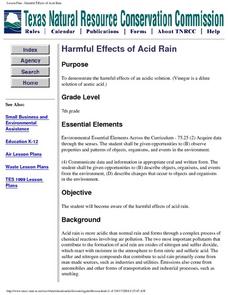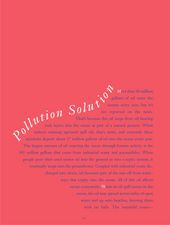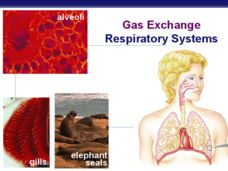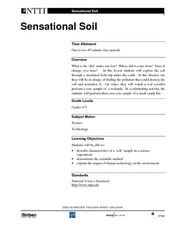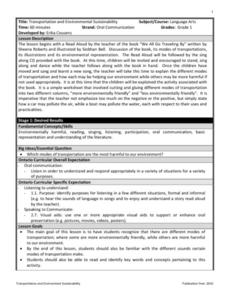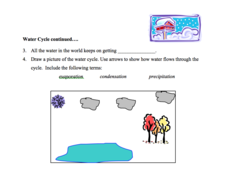Curated OER
Build Your Own Hovercraft
Students construct a hovercraft following specific procedures. In this technology lesson, students explain the physics principles behind hovercraft. They compare and contrast this machine with the aircraft.
Curated OER
Harmful Effects of Acid Rain
Seventh graders are able to demonstrate the harmful effects of an acidic solution. They become aware of the harmful effects of acid rain. Students make predictions before they began the experiment. If vingegar contains acid, then how...
Curated OER
Let's Heat Things Up!
Students build and evaluate simple models to understand the greenhouse effect. They explore the role of increased greenhouse gas concentration in global warming, and the implications of global warming theory for engineers, themselves...
Curated OER
Good News - We're on the Rise!
Students build and observe a simple aneroid barometer to discover changes in barometric pressure and weather forecasting. They graph changes in barometric pressure for two weeks and make weather predictions.
Curated OER
The Urban Explosion
Students investigate the uncontrolled development of the world's major cities. They define key vocabulary terms, view and discuss video excerpts, and complete a project that involves drawing a "perfect city," developing a plan to...
Curated OER
TE Activity: Pollution Politics
Students examine how a bill becomes a law in the US Congress. They investigate legislation about global warming. They determine the role of engineers as they educate Congress, the public and other government institutions about global...
Curated OER
Sleet and Hail Have Their Own Seasons
Second graders explain the definition of hail and sleet. In this precipitation instructional activity, 2nd graders discuss when hail and sleet fall and the results of hail falling.
Curated OER
Protecting Our Planet
Students examine the impact of pollution. In this pollution lesson, students watch Protecting Our Planet, then participate in a simulation of the effect of pollution on a variety of organisms.
Curated OER
Planting Trees to Help the Planet
Students react to a series of statements about trees, then read a news article about the planned planning of millions of trees to celebrate Arbor Day. In this planting trees lesson, the teacher introduces the article with a discussion...
Curated OER
Molehill or Mountain
Students explore the concept of waste management. In this environmental stewardship lesson, students consider the trash generated by people per day and discuss what steps they can personally take to reduce waste.
Curated OER
Pollution Solution!
Learners listen to the story "Clean Air, Dirty Air" by Lynne Patchett and discover the main types of pollution and how these affect their bodies. In this pollution activity, students work in small groups to create a machine to prevent...
Curated OER
Ecosystems and Remote Sensing
Students obtain remote sensing data to compare and contrast global biomass data with global temperature data.
Curated OER
Gas exchange: Respiratory Systems
The need for a respiratory system in humans versus being reliant on gas exchange structures is demonstrated. There are many details about the advantages and disadvantages of each mechanism. Students are able to learn about the...
Curated OER
Gas Exchange And Respiratory Systems.
Explore structures within the realm of gas exchange in terrestrial and aquatic life. The excellent, labelled diagrams and clear descriptions help your students view the different structures and adaptations that have developed. The 29...
Curated OER
Sensational Soil
Fourth and fifth graders explore soil by taking a simulated field trip under the earth. They go to an Internet site that runs a simulation which charges them with finding a source of pollution that could destroy all of Earth's soil, and...
Curated OER
Suited for Space
A fantastic lesson on survival in outer space should excite your learners! Pupils explore the challenges that living, working, and surviving in space elicit. They focus on the spacesuit itself; how it protects astronauts, and enables...
Curated OER
Make Your Own Temperature Scale
Differentiate between temperature and thermal energy. Your class will build a thermometer using simple materials and develop their own scale for measuring temperature. Discuss with your class and consider why engineers need to understand...
Curated OER
Transportation and Environmental Sustainability
After listening to the book, We All Go Traveling By, 1st graders discuss different modes of transportation that they see out in the world, and the environmental impacts of each one. Kids work together to create a list of the types of...
Curated OER
Water, Water Everywhere!
Learners brainstorm on ways they use water, and where water comes from. They view video, Down the Drain, to gain specific facts about water use, properties of water, problems of water and the water cycle. They perform a lab activity...
SeaWorld
Marvelous Manatees
Here is an interesting lesson on the manatee for your upper graders or middle schoolers. A game is played where learners work together to complete a successful manatee migration. It's a board game, and all of the game components are...
Curated OER
Archeologists For a Day
Students listen to a reading about fossils and go on a hunt for items with fossil characteristics. In this cross curricular fossil instructional activity, students will examine their fossil finds and create a graphic organizer. ...
Curated OER
Single Event Upsets in Aircraft Avionics
In this aircraft avionics worksheet, science fans read about the first unmanned air vehicle that collects data about the Earth and is subject to damage by cosmic ray showers. Pupils analyze two graphs of data showing the neutron flux vs....
EngageNY
TASC Transition Curriculum: Workshop 15
What do a cheetah, Audi commercial, and air have in common? They're all topics of an engaging inquiry-based, hands-on workshop for educators about background knowledge, reading strategies, the CER model, and argumentative writing. The...
Population Connection
The Carbon Crunch
Carbon is in the air; should we care? Teach the class why it is important to pay attention to carbon levels and how the world population and various countries across the globe affect the carbon levels in the atmosphere. High schoolers...



